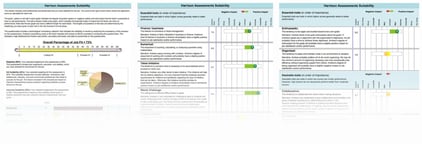PSMJ launches new performance benchmarking tool specifically for architectural and engineering project managers.
PSMJ Resources, Inc. has teamed up with Talent Matters to create the newest Harrison Assessment Job Success Formula (JSF)—one specific to the project manager role in the architectural and engineering (A/E) industry. Earlier this year, about 100 project managers from seven engineering and architecture firms helped create the newest JSF, which offers the insightfulness of the Harrison Assessment Performance Benchmarking methodology combined with the specific performance ratings of PMs that excel in the A/E environment.
 The methodology involves correlating the performance ratings of A/E project managers—working engineers and architects managing significant projects—with 175 work-related traits the Harrison Assessment already measures. “The work identified essential and desirable traits, and traits to avoid for this business-critical role,” explains Reid Tolley, President of Talent Matters LLC.
The methodology involves correlating the performance ratings of A/E project managers—working engineers and architects managing significant projects—with 175 work-related traits the Harrison Assessment already measures. “The work identified essential and desirable traits, and traits to avoid for this business-critical role,” explains Reid Tolley, President of Talent Matters LLC.
Essential traits are those that are distinct or different about highly-rated project managers. Desirable traits are behaviors that are shared by top performers, good performers, and average performers. Traits to avoid are those that are distinct about poorly-performing project managers. These are the behavioral tendencies that derail one’s effectiveness.
Firms with candidates for project management roles can administer the Harrison Assessment and compare the results to the Job Success Formula. This allows firms to flag skill gaps, and pinpoint the support the new person may need to get started. Firms can also have their PMs who are already working on projects take the assessment, and thus, uncover very specific behavioral terms and strengths, as well as development needs.
“We could not have completed the study without the support and active participation of Gannett Fleming, DLR Group, WK Dickson, Phillips Architecture, Hanson Inc., Banning Engineering, and WithersRavenel. We want to acknowledge their contribution and the commitment of time it took to accomplish performance ratings and promote participation among incumbent project managers,” says PSMJ Principal David Burstein, P.E., AECPM.
For years, we’ve heard the frustrations of Principals, HR Directors, Training Managers, and many others in A/E/C firms. They are investing in training and developing their Project Managers, but have no easy way to measure where the greatest needs are, which Project Managers need the most (and least) training, and which individuals really have what it takes become a Project Manager. So, the outcomes were often wasted training dollars, diminished project delivery performance, and an endless cycle of guessing what the fix is. And generic personality profiles and tests where of little or no use for architecture and engineering firms. Until now. To learn more about PSMJ’s newest Harrison assessment:
Members of A/E/C Project Management Association can get this assessment at membership rates:




